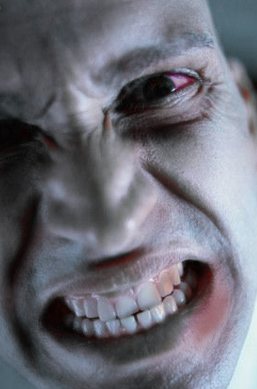A contributing member of the Zombie Research Society, Sarah George, has put forth an interesting theory about zombie facial expressions. George’s background is in animal behavior and body language, and she suggests that the common representation of a gnashing, angry zombie is likely inaccurate.
 The crux of her argument is that predators hunting prey in the wild do not use any facial expressions at all. They are focused on their goal, and so have a blank look of pure concentration. She continues on to say that aggressive postures in the eyes and mouth do not suggest a willingness to attack, but the exact opposite.
The crux of her argument is that predators hunting prey in the wild do not use any facial expressions at all. They are focused on their goal, and so have a blank look of pure concentration. She continues on to say that aggressive postures in the eyes and mouth do not suggest a willingness to attack, but the exact opposite.
“When an animal snarls, growls, or shows its teeth, the behavior is designed as a warning system. It is trying to avoid a physical confrontation, not invite one. There is little need for these types of displays once actual violence starts.”
It seems zombies may not act like wild animals trying to avoid a fight, but rather have an empty, hollow visage. It’s widely accepted that their singularity of purpose does not invite debate, discussion, or compromise, so it stands to reason that a zombie’s face wouldn’t express these tendencies either.
*Reposted by reader request.
 Zombie Research Society
Zombie Research Society

Iv worked with animals it’s true in fact the thing that’s not said here is that they may not make any noise either.
I Agree. Look at the early zombie films like Zombie Flesh eaters, NOTLD, DOTD, these zombies had completely expressionless faces…a lot scarier than today’s snarling zombies.
Personally I beleive that Zombies make the ‘snarling noise becauseof the decay of their respiartory systems (including the mouth and tongue) due to their condition (death), another contributing factor would be that many Zombies end up biting off their own tongues and so the ‘snarling’ noise is the sound of air passing over the stub of their tongue blocking the oesophagus.
this theory is probably incorrect because “predators” hunt. Zombies are a virus ( in most theorys anyway) and so this is what makes zombies so scary to people because a predator knows not to overhunt his hunting grounds a virus however does not care for such protocal. its main goal is to spread no matter what. I would say this were true of werewolves or vampires, but zombies have turnd into a different kind of creature.
I also agree that this article is correct. It makes sense too since the Hollywood interpretation of fiend or zombie would be to snarl and act menacing. This also adds more of a person versus them scenario. I watched a certain scene from the Walking Dead however, in the first episode, where the main character comes out of his house and sees a being (zombie) shambling around. The zombie however, makes no growling or aggressive sounds, and I’m sure if he had waited for the creature to come to him, he would have mistaken him for a human and have been eaten. This shows, that if a zombie passively hunts it’s prey, then it will not be as threatening. Which is probably why a lot of people will be infected in the beginning of an apocalypse.
I agree with this. Zombies’ behavior would be mostly accredited to the virus’s takeover of the human body. If the virus is simply programmed to pursue and eat it would not concern itself with aggressive behavior, only the behavior needed to fulfill its functions. Therefore a zombie would appear more like a robotic being with human features.
As for the moaning I too believe that to be a communicative action; the virus would be manipulating the vocal chords in order to attract more Zs to the feast and increasing the chance of successfully feeding.
Maybe they ARE trying to avoid a confrontation. If any human aspect to their mentality still remains then this will be attempting to resist the zombie-urge to kill. The snarling may simply be the sign of internal struggle.
It may also be worth noting that the perceptions of Zombies as “snarling” creatures stems mostly from their portrayal by human actors. It is possible that the characteristic “snarl” is merely a way to mimic the actual post-mortem behavior of dead lips, which naturally retract from the gums.
Interesting theory. To play devil’s advocate, it might be worth raising the issue that the theory rests on the premise of communication to begin with; animals make menacing displays with a communicative purpose. Yet while it is possible that zombies can learn to communicate on some level (cf. the Logan experiments with subject “Bub”), there’s not much evidence that they intend to do any communicating of any kind.
For instance, the famous moaning (which may or not be physiologically possible, but that’s another debate) would, in the animal world, probably also be some kind of communication, as most vocalizations seem to be. I’d be pretty reluctant to believe that moaning is meaningful communication, however.